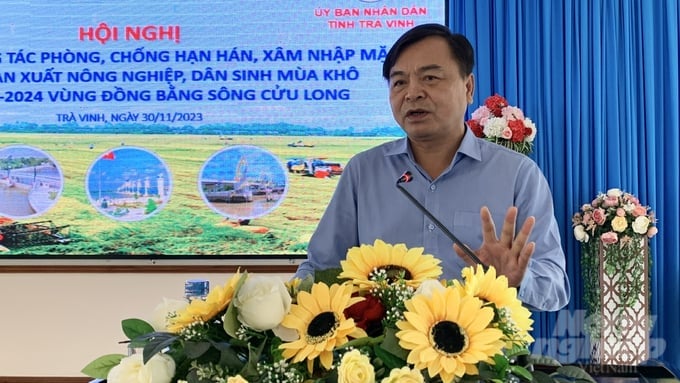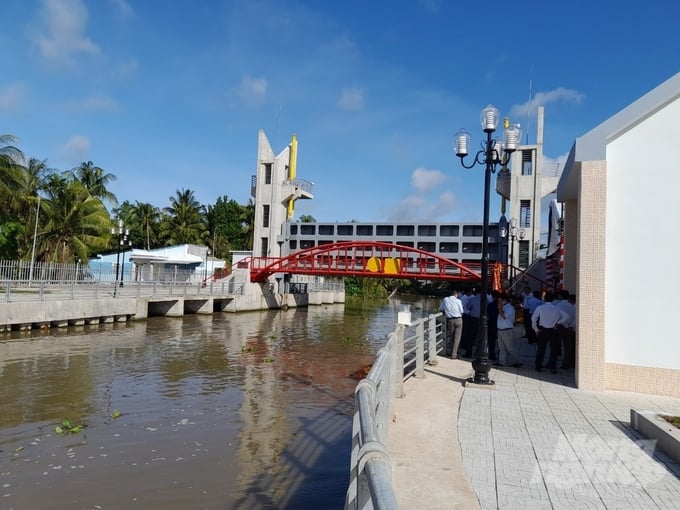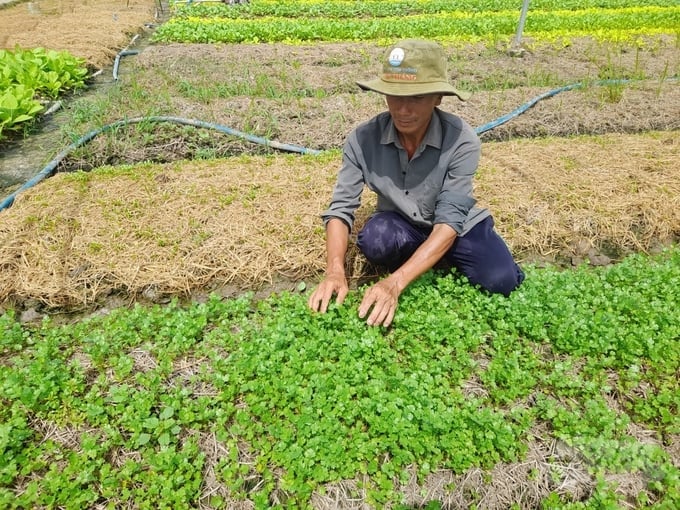June 16, 2025 | 20:58 GMT +7
June 16, 2025 | 20:58 GMT +7
Hotline: 0913.378.918
June 16, 2025 | 20:58 GMT +7
Hotline: 0913.378.918

According to Deputy Minister of Agriculture and Rural Development Nguyen Hoang Hiep, in the future salinity prevention works must ensure support and environmental protection, while also preventing subsidence and flooding due to high tides in urban areas. Photo: Ho Thao.
According to forecasts of the Department of Meteorological and Hydrological Administration and scientific agencies under the Ministry of Agriculture and Rural Development, rainfall in the Mekong River basin in the dry season months of 2023-2024 is lower than the average of many years. The area of fruit trees at risk of being affected is about 43,000 ha, occurring over 4 provinces: Long An (Tan Tru district), Tien Giang (Cho Gao, Go Cong Tay districts), Ben Tre (Chau Thanh, Mo Cay South - North and part of Cho Lach), Soc Trang (Ke Sach and Long Phu districts) along with about 60,000 ha of rice area in the Mekong Delta are also at similar risk.
At the Conference "Implementing the work of preventing and combating drought and saltwater intrusion, ensuring agricultural production and people's livelihood in the dry season in 2023-2024 in the Mekong Delta", held in Tra Vinh, organized by the Ministry of Agriculture and Rural Development, Mr. Nguyen Quynh Thien, Vice Chairman of Tra Vinh Provincial People's Committee said, to proactively respond to the risks of heat, drought, water shortage and saltwater intrusion in the province, Tra Vinh has developed a response scenario when situations occur. Specifically, these scenarios include when the Co Chien and Hau River estuaries are saline with a 4‰ salinity line penetration of 25 - 50km deep or when the Co Chien and Hau River estuaries become salty with a 4‰ salinity line penetrating more than 50km from the river mouth.
Vice Chairman of Tra Vinh Provincial People's Committee proposed that the Ministry of Agriculture and Rural Development invest in more culverts in the Nam Mang Thit irrigation system, especially Say Don sewer, Vung Liem district to regulate and direct water for production, consider investing in installing automatic measuring equipment to monitor water sources and salinity for the Mekong Delta.

Tra Vinh province proposed that the Ministry of Agriculture and Rural Development invest in additional sewer systems to prevent saltwater intrusion and install water measuring equipment in the Mekong Delta region. Photo: Ho Thao.
Deputy Minister of Agriculture and Rural Development Nguyen Hoang Hiep requested localities to focus on implementing the Ministry's instructions at the Preliminary Conference on crop production and implementation of the 2023-2024 winter-spring crop in the Mekong Delta. The Water Resource Sub-department and the Department of Crop Production are assigned to coordinate closely to review and recommend the organization of production and seasonal structure appropriate to each locality.
Also according to Deputy Minister Nguyen Hoang Hiep, there needs to be solutions to ensure enough fresh water supply for people's daily activities and production. Localities need to review all households to ensure that no household lacks water, and at the same time ensure enough water is stored for agricultural production according to the Ministry's instructions.
For rice, it is possible to sow seeds early to avoid drought, use salt-tolerant varieties or switch to other more effective crops. For fruit tree areas, it is necessary to strengthen the system of dikes and embankments surrounding the garden to prevent saltwater intrusion and strictly control salinity before each water intake.
For aquaculture areas, it is necessary to strengthen environmental monitoring of key farming species during periods of increased saline intrusion, and build and direct production seasons suitable for each farming species and ecological region to minimize damage caused by drought and saltwater intrusion.

Many farming areas in the Mekong Delta may be affected by the impact of drought and saltwater intrusion in the first months of 2024. Photo: Ho Thao.
Also according to Deputy Minister Nguyen Hoang Hiep, saltwater intrusion is a phenomenon that repeats every year and requires a long-term treatment process. In particular, the plan to control salinity more widely must consider investing in additional salinity prevention gates and large river intersections such as Ham Luong and Co Chien. These works must also support environmental protection and prevent subsidence and flooding in urban areas.
The Deputy Minister also reminded projects that are being invested in and built with the goal of preventing and combating drought and saltwater intrusion, it is necessary to speed up the construction progress to put it into operation in the dry season of 2023-2024.
Translated by Hoang Duy

(VAN) The working delegation from the Ministry of Agriculture and Environment conducted an important trip to the Netherlands to strengthen strategic partnerships and sustainable development in the agricultural sector.

(VAN) The letter ‘A Plea from the Ocean’ not only evokes emotion but also awakens the human conscience to the responsibility of protecting life on Earth.

(VAN) The Department of Agriculture in South Africa has announced the country’s first mass vaccination of poultry to prevent local birds from contracting avian influenza.

(VAN) Establishment of the Mekong Delta Regional Agricultural Linkage Center, aiming for a closed value chain, deep processing, trading platforms, and international market connectivity.

(VAN) Gia Lai province has recently recorded 460 rare species of animals and plants, contributing to forest conservation and biodiversity planning in the region.

(VAN) Ms. Caroline Beresford, New Zealand Ambassador to Vietnam, expressed confidence that agricultural cooperation between Vietnam and New Zealand will develop sustainably, be climate-resilient, and promote gender equality.

(VAN) Vietnam reaffirms its commitment to international cooperation in fostering sustainable and responsible fisheries while ensuring resilient livelihoods for small-scale fishing communities.